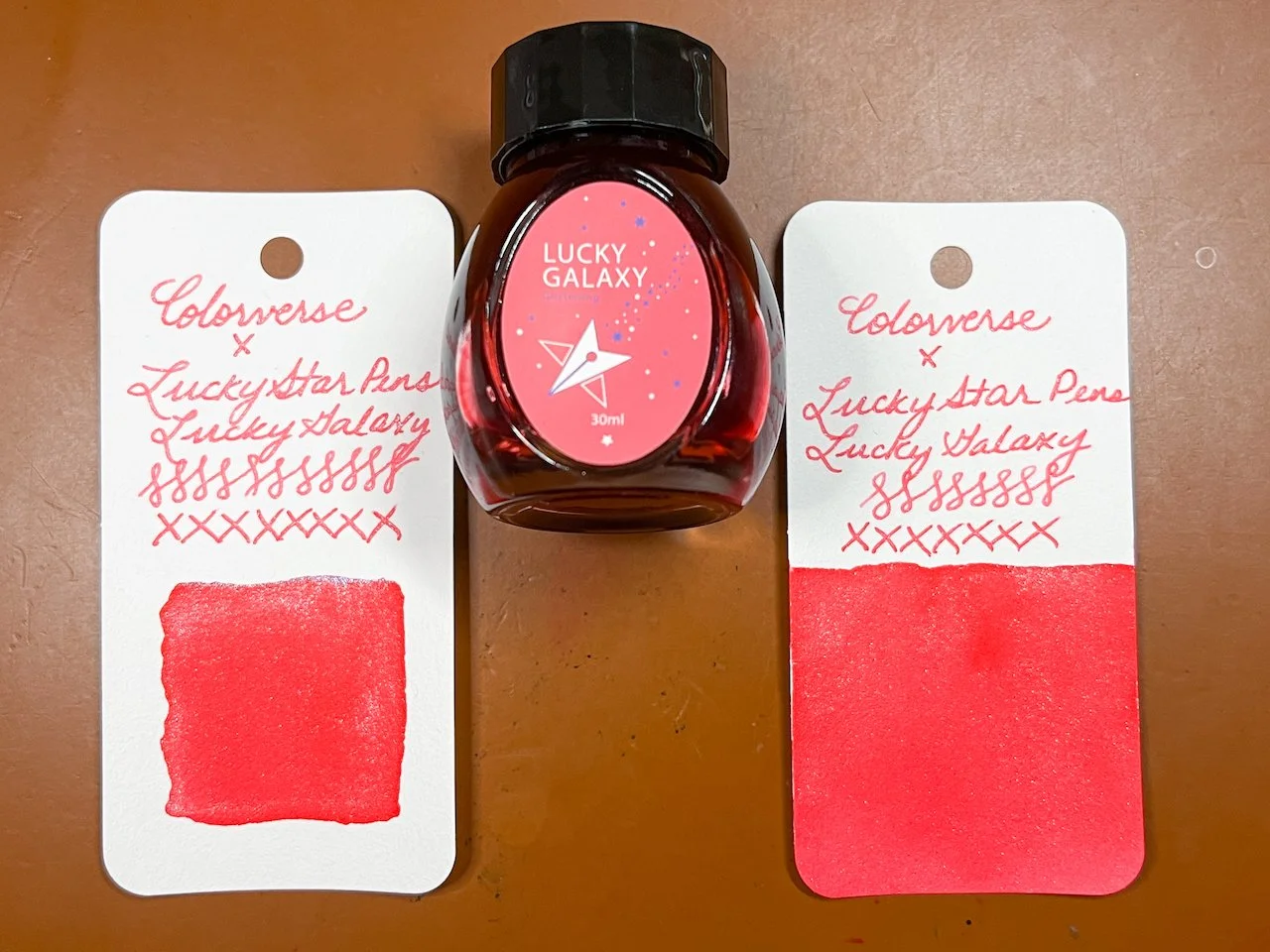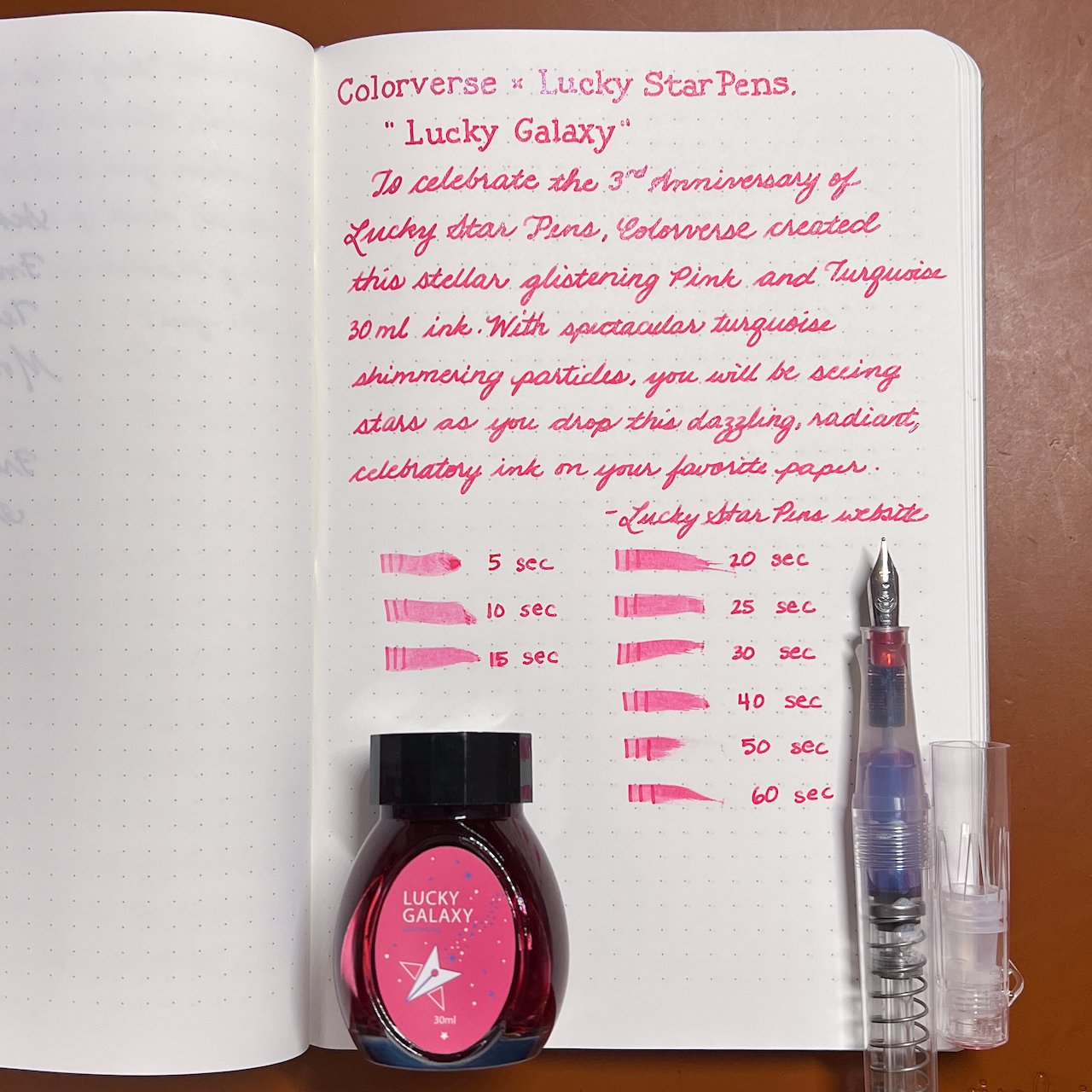(Kimberly (she/her) took the express train down the fountain pen/stationery rabbit hole and doesn't want to be rescued. She can be found on Instagram @allthehobbies because there really are many, many hobbies!.)
As soon as Lauren Elliott, AKA FlygirlElliott and Lucky Star Pens posted about the latest addition to the Lucky Star Colorverse lineup, I knew I had to buy one, which is exactly what I did at the recent Baltimore Pen Show. Colorverse Lucky Galaxy is the third exclusive release for Lucky Star Pens and was created to celebrate its 3rd anniversary. The prior two releases were Lucky Star and Lucky Star II. Like the other two before it, Lucky Galaxy is a shimmer ink, or what Colorverse calls “Glistening”. The ink comes in a 30ml glass bottle and sells for $20.
The 3 Colorverse x Lucky Star Pens inks: Lucky Star, Lucky Star II and Lucky Galaxy.
I inked up my trusty TWSBI Go with a Medium nib and used that for the writing samples on the Col-O-Ring cards. For the other writing samples, I used the Kakimori steel dip nib with 52 gsm and 68 gsm Tomoe River and Cosmo Air Light 75 gsm papers.
In large swatches, Lucky Galaxy leans more red than pink.
Writing sample on 52 gsm Tomoe River paper.
68 gsm TR.
Cosmo Air Light 75 gsm paper.
In the writing samples, the pink is more pronounced.
The shimmer is there but not in-your-face, which I like.
The turquoise/blue shimmer can make it look kind of blurple but what you see near the nib is the real ink color.
Lucky Star Galaxy had an average flow when writing but definitely took a while to dry on 68gsm TR. Dry times may be a bit slower on 52gsm TR or faster on papers like Rhodia, copy paper, Cosmo Air Light or with drier or finer nibs. The ink has blue/turquoise shimmer, minimal shading and no sheen.
Inks similar to Lucky Galaxy are Diamine Pink Glitz (gold shimmer), Diamine 2019 Inkvent (Blue Edition) Candy Cane (no shimmer), Sailor Ink Studio 731 (no shimmer but gold sheen), Colorverse #49 Felicette (no shimmer), and Diamine 2021 Inkvent (Red Edition) Pink Ice (silver shimmer.)
While I have similarly colored inks in my collection, it’s not often that non-gold or silver shimmer is used so I’m glad that Lucky Galaxy has a different shimmer. This ink sells for $20 per 30ml bottle on the Lucky Star Pens website, which is about the perfect amount for a bottle of ink.
BUT WAIT! There’s more!! Just when you thought this article was over, it’s not over!! I thought I’d share something new that I decided to do for ink reviews - chromatography! Basically, chromatography is a way to show the various components of a mixture (in this case, ink) as different parts get drawn up the strip via capillary action at different rates. As it relates to ink, this means chromatography allows you to see the colors that make up the ink.
What you need to do ink chromatography
- Chromatography strips - You can find them on Amazon - the ones I have (which are out of stock) are about 6” x 0.75”. I have not tried these personally but I have heard that white coffee filters (cut into strips) or even paper towels, can be used in lieu of chromatography strips.
- Cup - I use glass so there is no risk of staining if I accidentally get ink in there
- Rod - A chopstick, slim pen/pencil, wooden dowel, or in this case, a paintbrush, will work
- Clip - You will need a clip to secure the strip. I use binder clips because I can suspend the strip from the rod.
Wine glass (cuz I’m bougie that way), binder clip, chromatography strip, paintbrush.
How to do ink chromatography
- Put some water in your glass
- Depending on how tall your glass is and how much water you put in it, you may need to trim your strips or add/remove some water. You want the strip to touch the water a bit but you don’t want to submerge the ink.
Strip is on the outside of the glass so I can see if it will touch the water.
- Draw a line across the strip about ½” from the bottom (does not need to be exact.)
Testing this outside the glass so I can add/remove water as needed.
- Put the rod through the binder clip and rest it on the glass such that the strip touches the water, then you wait.
You can see the ink line is above the water line and is already beginning to “move up.”
Roughly 4 minutes in.
I waited until 5 minutes when the ink “stopped moving” before removing it from the glass. Duration of wait time will vary based on how quickly the ink is separating up the strip. If you wait too long, the colors may get too diluted and be harder to detect.
Letting the strip dry on a paper towel (no, those aren’t blood stains, just Lucky Galaxy!)
Closeup reveals a hint of shimmer at the base where I drew the line and basically pink ink throughout.
Contrast that with a multi-shading ink (or chromashader) like Sailor Manyo Fuji which shows shades of magenta/pink and blue, with a bit of yellow above the pink.
While chromatography isn’t necessary to enjoy inks, it is a fun way to see how similarly colored inks may have underlying differences that aren’t as noticeable in writing samples or ink swatches. I can’t wait to see my future ink chromatographies.
(Disclaimer: I purchased Lucky Galaxy ink at regular price from Lauren Elliott at the 2023 Baltimore Pen Show.)






















